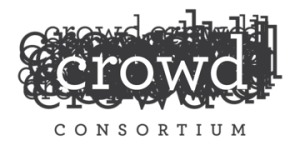FOR IMMEDIATE RELEASE
Institute of Museum and Library Services-Funded
Crowdsourcing Consortium for Libraries and Archives
to Host Inaugural 2014 Open Webinar
Crowdsourcing 101: Fundamentals and Case Studies” Webinar
on October 29, 12pm EDT.
HANOVER, N.H. – October 20, 2014 –The Crowdsourcing Consortium for Libraries and Archives (CCLA) announced the first in a series of international webinars, titled ‘Crowdsourcing 101: Fundamentals and Case Studies,’ scheduled for October 29 at 12 pm EDT. Crowdsourcing in the humanities is an emerging new area for museums, libraries, and archives. The CCLA was formed earlier this year with an Institute of Museum and Library Services (IMLS) award, with the goal to unite leading-edge technology groups in libraries and archives as well as humanities scholars and scholars from the sciences in a conversation about best practices, shared toolsets, and strategies for using crowdsourcing.
The CCLA project was initiated by Mary Flanagan, Sherman Fairchild Distinguished Professor in Digital Humanities at Dartmouth, who as founding director of Tiltfactor, has extensive experience with crowdsourcing and developing engaging games for prosocial causes. “The idea for the CCLA is to help our community share knowledge and tools across the disciplines,” says Flanagan. “There is a great deal of interest among humanities institutions to learn from science initiatives as well as those new project emerging from traditional humanities areas.”
The CCLA is engaging top experts in the field through a series of regional U.S. meetings, the most recent of which occurred in Boston last month. A culminating national meeting will be held in Washington, DC, in May 2015.
The two planned webinars are part of the first year of the CCLA initiative and will feature internationally recognized experts in crowdsourcing. The webinars will be open and accessible to anyone using crowdsourcing currently, as well as to those who may be curious about using this technology in libraries and archives in the future. “The webinars will help boost the crowdsourcing conversation to a national and international level,” said Sukdith Punjasthitkul, a project manager at Tiltfactor, who is coordinating the CCLA project.
The October 2014 webinar, moderated and hosted by OCLC, will include the presentations “Crowdsourcing 101” with Open University’s Mia Ridge, and exemplar case studies from NYPLab’s Ben Vershbow and Zooniverse’s Victoria Van Hyning. Participants around the globe will have the opportunity to ask presenters questions at the end of the webinar.
‘Crowdsourcing 101: Fundamentals and Case Studies’ is free and open to the public. For more information about participating in the webinar and to RSVP, visit: http://bit.ly/1sNUilU. Institutions interested in joining the Crowdsourcing Consortium for Libraries and Archives should email: contact@crowconsortium.org.
Follow the Crowd Consortium on Twitter: @crowdconsortium.
Media contacts:
Amy D. Olson
Amy.D.Olson@dartmouth.edu
603-646-3274
Giuliana Bullard
202-653-4799
gbullard@imls.gov
###
About the Institute of Museum and Library Services
The Institute of Museum and Library Services is the primary source of federal support for the nation’s 123,000 libraries and 35,000 museums. Our mission is to inspire libraries and museums to advance innovation, lifelong learning, and cultural and civic engagement. Our grant making, policy development, and research help libraries and museums deliver valuable services that make it possible for communities and individuals to thrive. To learn more, visit www.imls.gov and follow us on Facebook and Twitter.
About Tiltfactor Laboratory at Dartmouth College
Tiltfactor Laboratory, a design studio based at Dartmouth College, is dedicated to understanding how games can be used to generate new knowledge. Tiltfactor designs, studies, and launches games, across a variety of platforms and they use psychological principles and strategies to promote learning and impact players’ thoughts and behaviors. Founded and led by Dr. Mary Flanagan, Tiltfactor incorporates fundamental human values and psychological principles to promote pro-social values such as cooperation, perspective taking, empathy, and civic engagement. For more information on this design methodology, see Flanagan’s latest book Values at Play in Digital Games (2014, MIT Press). Visit www.tiltfactor.org and follow us on Facebook and Twitter via @tiltfactor and @criticalplay.




